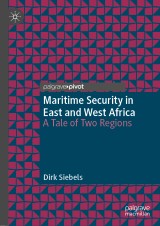Details

Maritime Security in East and West Africa
A Tale of Two Regions|
58,84 € |
|
| Verlag: | Palgrave Pivot |
| Format: | |
| Veröffentl.: | 02.07.2019 |
| ISBN/EAN: | 9783030226886 |
| Sprache: | englisch |
Dieses eBook enthält ein Wasserzeichen.
Beschreibungen
<p>This book examines the nexus between maritime security and the ‘blue economy’ in sub-Saharan Africa. In recent years, maritime security issues have received increasing attention, but academic and policy-related discussions are largely limited to counter-piracy operations and, to a smaller extent, problems related to illegal fishing. This project offers an essential addition to the current academic and political discourse, combining a broad range of statistics with primary research and findings from more than 40 interviews with key stakeholders. It provides a unique analysis, recognizing that maritime security is not an end in itself but rather linked to economic and immaterial benefits of a more secure environment at sea.</p><br>
<div><p>1. Chapter 1: Introduction</p><p>2. Chapter 2: Definitions and Available Literature</p><p></p>
<p>3. Chapter 3: Lubricants for Development</p>
<p>4. Chapter 4: A Victimless Crime</p>
<p>5. Chapter 5: Growing Together</p>
<p>6. Chapter 6: Contrasting Regions</p><p>7. Conclusion </p></div>
<p>3. Chapter 3: Lubricants for Development</p>
<p>4. Chapter 4: A Victimless Crime</p>
<p>5. Chapter 5: Growing Together</p>
<p>6. Chapter 6: Contrasting Regions</p><p>7. Conclusion </p></div>
<p><b>Dirk Siebels</b> is Senior Analyst at Risk Intelligence, Denmark.</p><br>
<div><p>‘In this century more than ever, the maritime governance discourse requires useful tools that point states and other actors in the best possible direction. This is what Dirk has done. He has not discussed maritime security in abstract: this book perfectly examines the critical linkages between good ocean governance, investment and durable maritime security outcomes.’ </p>
<p>—Kamal-Deen Ali, Captain Ghana Navy (Rtd.) and Executive Director CEMLAWS Africa, Ghana</p>
<p>‘The author skillfully presents a detailed, balanced and coherent account of contemporary maritime security, regional cooperation and the blue economy in two distinct regions of Africa with wider relevance for policy makers and practitioners alike.’</p>
<p>—Robert McCabe, Assistant Professor, Coventry University, UK</p></div>This book examines the nexus between maritime security and the ‘blue economy’ in sub-Saharan Africa. In recent years, maritime security issues have received increasing attention, but academic and policy-related discussions are largely limited to counter-piracy operations and, to a smaller extent, problems related to illegal fishing. This project offers an essential addition to the current academic and political discourse, combining a broad range of statistics with primary research and findings from more than 40 interviews with key stakeholders. It provides a unique analysis, recognizing that maritime security is not an end in itself but rather linked to economic and immaterial benefits of a more secure environment at sea.<div><p><b>Dirk Siebels</b> is Senior Analyst at Risk Intelligence, Denmark.</p></div>
<p>—Kamal-Deen Ali, Captain Ghana Navy (Rtd.) and Executive Director CEMLAWS Africa, Ghana</p>
<p>‘The author skillfully presents a detailed, balanced and coherent account of contemporary maritime security, regional cooperation and the blue economy in two distinct regions of Africa with wider relevance for policy makers and practitioners alike.’</p>
<p>—Robert McCabe, Assistant Professor, Coventry University, UK</p></div>This book examines the nexus between maritime security and the ‘blue economy’ in sub-Saharan Africa. In recent years, maritime security issues have received increasing attention, but academic and policy-related discussions are largely limited to counter-piracy operations and, to a smaller extent, problems related to illegal fishing. This project offers an essential addition to the current academic and political discourse, combining a broad range of statistics with primary research and findings from more than 40 interviews with key stakeholders. It provides a unique analysis, recognizing that maritime security is not an end in itself but rather linked to economic and immaterial benefits of a more secure environment at sea.<div><p><b>Dirk Siebels</b> is Senior Analyst at Risk Intelligence, Denmark.</p></div>
<p>Offers an essential addition to the current academic and political discourse on maritime security</p><p>Highlights the economic potential of the maritime environment, underlining strategies adopted by the African Union and regional economic communities throughout Africa</p><p>Analyzes the results of different actors’ involvement in the provision of maritime security in East and West Africa</p>
“In this century more than ever, the maritime governance discourse requires useful tools that point states and other actors in the best possible direction. This is what Dirk has done. He has not discussed maritime security in abstract: this book perfectly examines the critical linkages between good ocean governance, investment and durable maritime security outcomes.” (Kamal-Deen Ali, Captain Ghana Navy (Rtd.) and Executive Director CEMLAWS Africa, Ghana)<p>“The author skillfully presents a detailed, balanced and coherent account of contemporary maritime security, regional cooperation and the blue economy in two distinct regions of Africa with wider relevance for policy makers and practitioners alike.” (Robert McCabe, Assistant Professor, Coventry University, UK)</p>
<p> </p>
<p> </p>
Diese Produkte könnten Sie auch interessieren:

Inclusión educativa de niños, niñas y adolescentes migrantes venezolanos, en Colombia

von: Douglas Jiménez

15,99 €
















